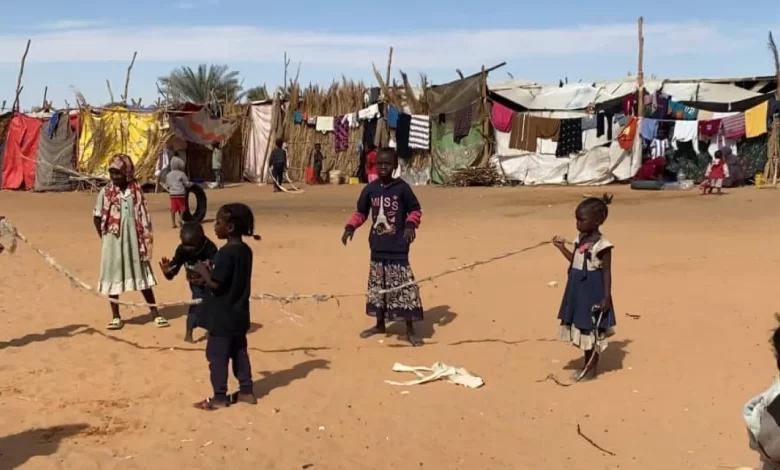Libya: Incitement Against Migrants Worsens the Plight of Sudanese Fleeing War

Sudan Events – Agencies
Incitement against irregular migrants in Libya has worsened the suffering of Sudanese fleeing the war, particularly those residing in the city of Kufra (in the south of the country).
The concerns of Sudanese migrants come amid political and public debate in Libya over the settlement of irregular migrants—an issue denied by Libyan authorities through official statements.
Recently, social media pages in Libya have seen a surge in inflammatory calls for the “deportation of irregular migrants.” Some bloggers have defended these calls in the past two days, arguing that “migrants are unwelcome.”
Human rights activists, including Libyan activist Tarek Lamloum, have documented what they describe as “incitement campaigns,” citing incidents such as the prevention of workers and Muslim migrants from entering Martyrs’ Square in Tripoli to celebrate Eid al-Fitr on the grounds that they lacked identification papers.
Lamloum shared on his Facebook page widely circulated images of buses belonging to the Department for Combating Illegal Migration surrounding Martyrs’ Square. However, there has been no official comment from the department on the matter.
Last month, Sudanese migrants in Libya expressed growing fears of “arrest, detention, and deportation,” as noted in a statement by the Sudanese embassy in Libya. The embassy attempted to reassure Sudanese nationals, stating that “the Libyan government’s official policies provide facilities and assistance to Sudanese migrants, treating them as guests.”
Abdullah Suleiman, spokesperson for Kufra Municipality, told Asharq Al-Awsat that “the local community welcomes Sudanese refugees and bears no hostility toward them.” However, he pointed to “severe pressure on the city’s infrastructure, including electricity, sanitation, and hospitals.”
The UN Mission in Libya previously issued a statement warning against “misinformation and hate speech” directed at refugees, stressing that such rhetoric “only fuels fear and hostility.”
For many Sudanese migrants in Libya, the Eid holiday was tinged with nostalgia and sorrow. Among them is Khalid Al-Aqib, 48, who described this Eid as yet another “celebration marked by sadness, exile, and displacement.”
Al-Aqib reminisced about past Eid celebrations in Khartoum, from which he fled three years ago. Speaking to Asharq Al-Awsat, he said, “I miss the gatherings of family and friends, the sweets, the sight of children playing and receiving Eid gifts, and a favorite restaurant I used to visit.”
As in previous years in Kufra, Al-Aqib made sure to stay in touch with his remaining family members in Sudan and check on their well-being. Some of his relatives have also sought refuge in Egypt. “The war has scattered our family and robbed us of the joy of Eid,” he lamented.
According to UN estimates, Kufra has become a major transit point for Sudanese fleeing to Libya, with 240,000 arrivals since the conflict began in April 2023. However, the spokesperson for Kufra Municipality questioned the accuracy of this figure, stating, “It is impossible to precisely count refugees crossing the Libyan-Sudanese border, as it is not strictly monitored.” He suggested that most migrants enter “through smuggling routes” and noted that the municipality has issued over 120,000 health certificates to refugees so far.
During the days of Eid al-Fitr, the humanitarian situation for Sudanese migrants in Libya remained dire. Many, including Al-Aqib, complained of “harsh living conditions, with some working in menial jobs, and rising hostility towards migrants.”
During Ramadan, Sudanese in Kufra used social media to seek aid. One woman, identified as “M.M.,” posted a plea for a food basket containing “flour, lentils, and beans,” writing, “We are displaced, orphans, and in need of help from a kind donor.”
The Kufra Municipality spokesperson acknowledged the difficult humanitarian conditions Sudanese migrants face but highlighted “initiatives from the municipality, Kufra residents, and civil society to assist them.”
During Ramadan, Kufra Municipality distributed 3,000 food baskets to Sudanese migrants, containing milk, rice, oil, tomatoes, and flour, along with setting up seven communal iftar meals, according to the municipal spokesperson.
Despite these efforts, “Sudanese in Kufra spent Eid in cramped tents made of fabric in farms on the city’s outskirts or in converted warehouses that provide little protection from the summer heat or winter cold.”
The United Nations has developed a humanitarian response plan for Sudanese in Libya, aiming to raise $106.6 million to support health, nutrition, education, food security, water, sanitation, and protection services.
Abdullah Suleiman acknowledged “humanitarian aid from international organizations,” citing contributions from the World Food Programme, the International Organization for Migration, and UNICEF.
Nevertheless, Kufra Municipality has criticized the UN’s response, arguing that “the assistance provided to refugees is insufficient.” The spokesperson stressed, “We need support for both the refugees and the host community, based on actual needs rather than estimations,” calling for “greater backing for service institutions struggling under intense pressure in a city that had only 60,000 residents before the wave of displacement.”



